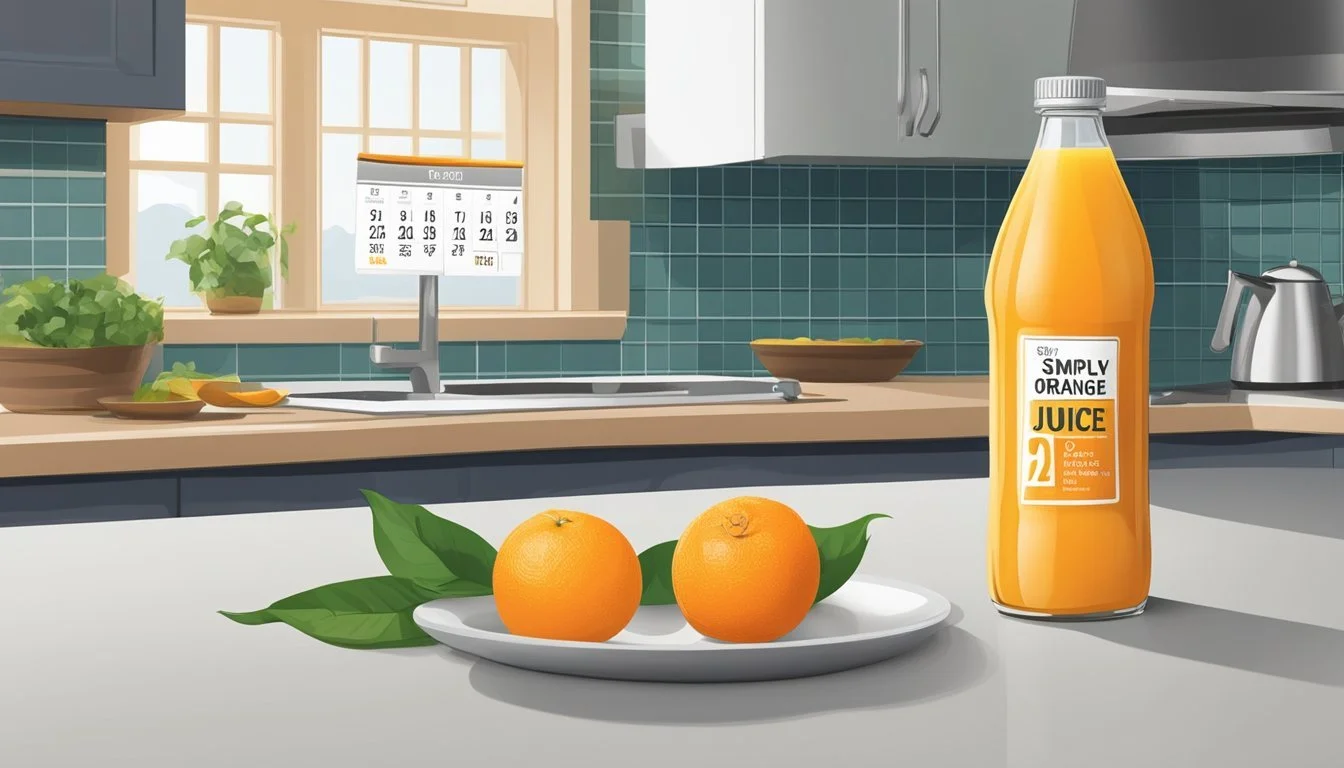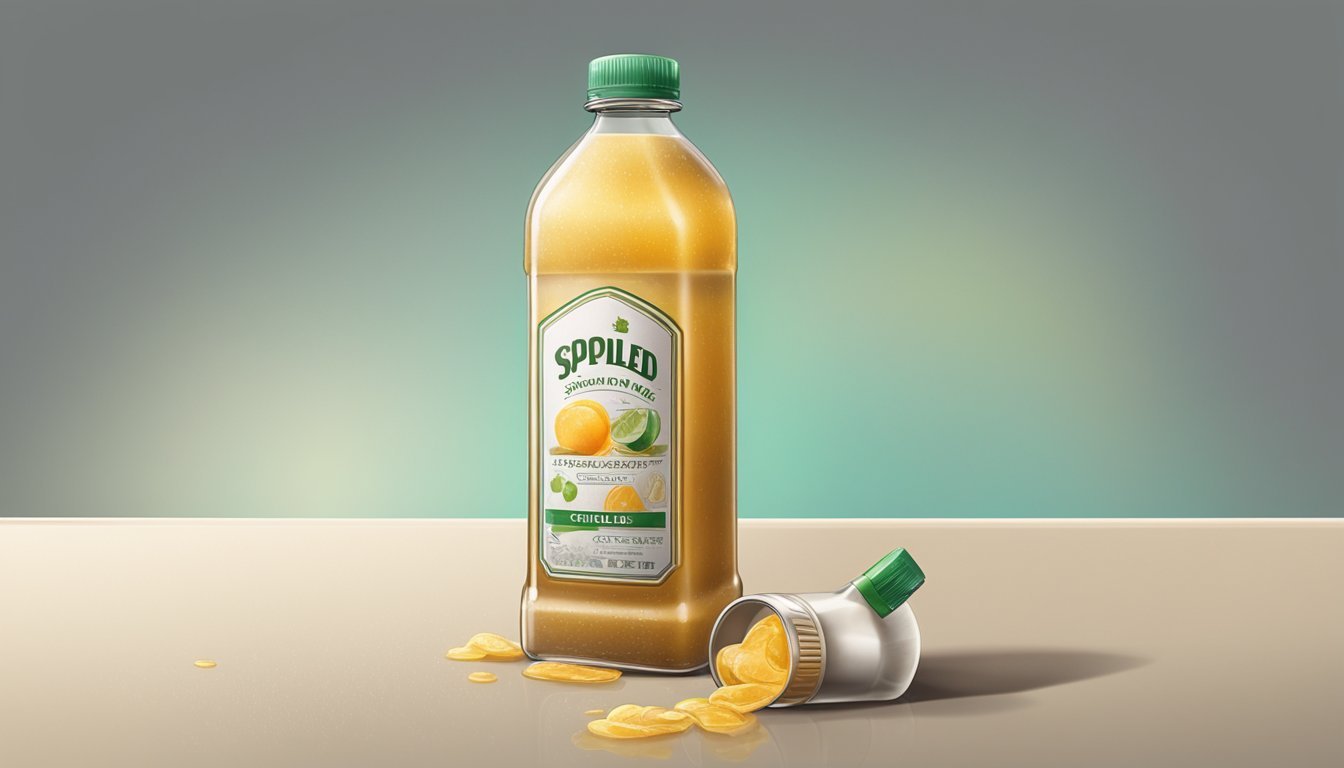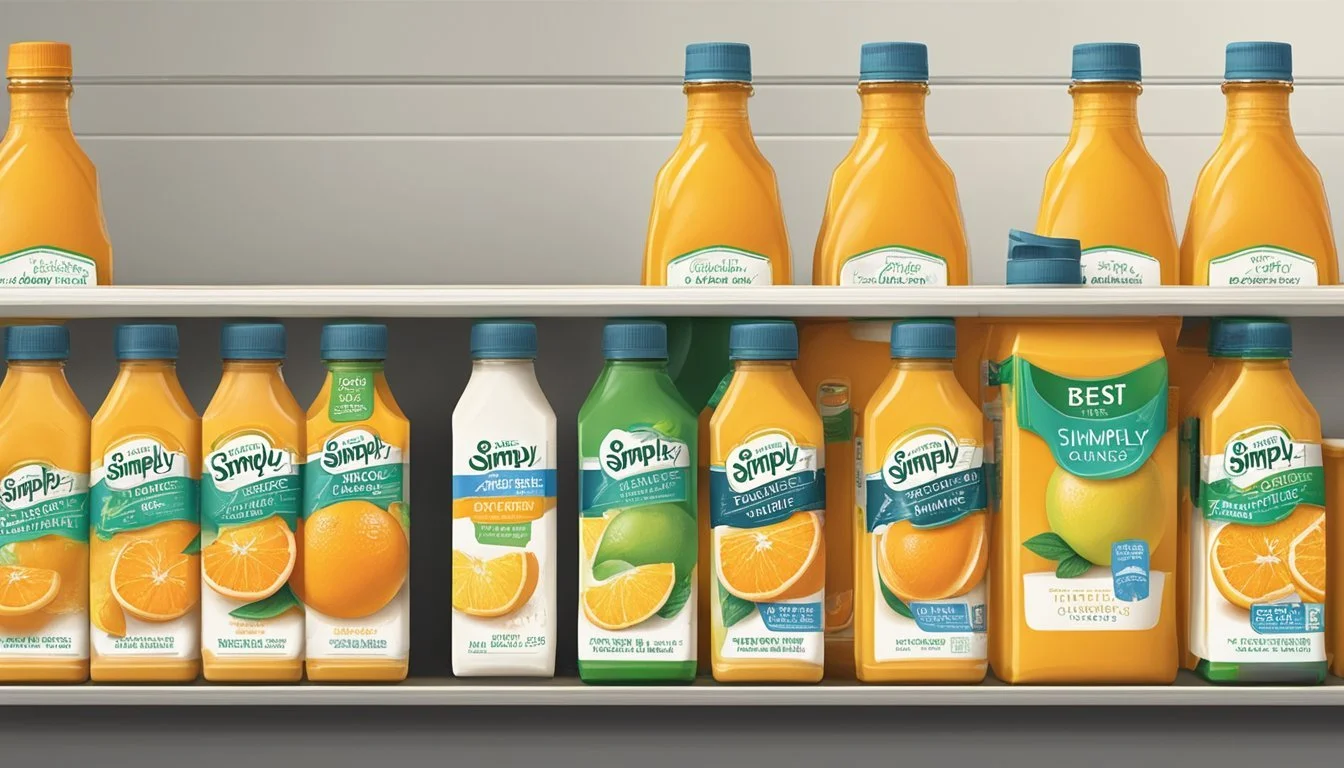How Long Does Simply Orange Juice Last?
Understanding Shelf Life and Storage
When considering the shelf life of Simply Orange juice, it's crucial to distinguish between opened and unopened containers. Unopened Simply Orange juice, when refrigerated, can last up to two weeks. It's important to store it at or below 40°F to maintain freshness. The juice is pasteurized, which helps extend its shelf life while still ensuring safety and taste.
Once opened, the freshness of Simply Orange juice begins to decline. Opened containers should be consumed within 7 to 10 days when kept refrigerated. The brand's commitment to not concentrate the juice, but rather provide a not-from-concentrate product, maintains a high quality of flavor, but also means that it may have a shorter shelf life than more heavily processed alternatives. For the best taste and quality, consumers are encouraged to adhere to the use-by dates and proper storage guidelines.
Understanding Orange Juice
When considering the shelf life and properties of Simply Orange juice, it is imperative to understand the various types of orange juice, their nutritional components, and potential health benefits.
Types of Orange Juice
Orange juice comes in various forms, each with different shelf lives and nutritional qualities. Freshly squeezed orange juice is made by extracting juice from orange fruits using methods like a hand press, masticating juicer, or centrifugal juicer. This version typically lasts 2-3 days when refrigerated. Store-bought orange juice, which includes brands like Tropicana and Minute Maid, comes in two main types: pasteurized and not pasteurized. Pasteurization extends the shelf life of orange juice. Canned orange juice is usually heat-pasteurized and has a longer shelf life of up to 1 year unopened. Lastly, bottled orange juice is pasteurized and can last unopened in the refrigerator for up to two weeks, with a reduced lifespan once opened.
Freshly Squeezed: 2-3 days in the fridge
Pasteurized: Up to 2 weeks unopened, 7-10 days opened
Canned: Up to 1 year unopened
Nutritional Components
Orange juice is prized for its high nutritional value, particularly its rich content of Vitamin C. A single serving of orange juice provides a significant percentage of the recommended daily intake for Vitamin C, essential for immune system function and skin health. Orange juice also contains vitamins such as vitamin A and B vitamins, nutrients like potassium, and various antioxidants. However, nutritional content can vary between homemade and commercial varieties.
Nutrient Function Vitamin C Immune support Vitamin A Vision and immune health B Vitamins Energy production Potassium Heart and muscle function Antioxidants Protect cells from damage
Potential Health Benefits
Consuming orange juice can confer several health benefits due to its rich composition of vitamins and antioxidants. Regular intake contributes to a stronger immune system and may help in reducing the risk of chronic diseases due to the presence of antioxidants. The nutrients in orange juice can also play a role in heart health by regulating blood pressure and promoting good cholesterol levels. It is important to note that moderation is key, as orange juice also contains natural sugars.
Boosts immune system
May reduce disease risk
Supports heart health
Storage Fundamentals
Proper storage techniques are essential for maintaining the quality and extending the shelf life of Simply Orange juice. Understanding the differences between refrigeration and freezing, ensuring airtight sealing, and controlling temperature can significantly influence how long Simply Orange juice remains fresh.
Refrigeration vs. Freezing
Simply Orange juice should be kept in the refrigerator at all times when not being served. Generally, the fridge temperature should be below 40°F (4°C) to maintain freshness. An unopened bottle can last up to 2 weeks or by the printed use-by date, whereas once opened, it is advisable to consume within 7 to 10 days. Freezing the juice is an option for long-term storage. When freezing, place the juice in an airtight container, leaving about 1/2 inch of headspace at the top to account for expansion. To use frozen juice, thaw it in the refrigerator before consumption.
Proper Sealing Techniques
Sealing is crucial to protect Simply Orange juice from oxygen and air exposure, which can degrade quality. When storing, always place the juice in an airtight container. If the original container is not airtight after opening, transfer the juice to one that seals properly. This will minimize oxidation and maintain the flavor and nutritional value of the juice.
Impact of Temperature on Shelf Life
The shelf life of Simply Orange juice is significantly affected by temperature. Consistently cold temperatures in the refrigerator help to retard bacterial growth and preserve the juice's fresh taste. It's important to avoid fluctuating temperatures, such as leaving the juice on the pantry counter, which can accelerate spoilage. Always return the juice to the fridge promptly after pouring to ensure it remains at a stable temperature.
Shelf Life of Orange Juice
The shelf life of orange juice varies depending on whether it is store-bought or homemade, and whether it is unopened or has been opened. Key factors affecting longevity include the type of container, the storage method, and pasteurization.
Unopened Orange Juice
Store-bought unopened orange juice in a sealed carton or plastic container typically lasts between one to two weeks past the printed use-by date if kept refrigerated. A carton of shelf-stable orange juice can last for up to 1-2 years if stored in a cool, dry place away from direct sunlight.
Opened Orange Juice
Once opened, orange juice should be kept refrigerated and ideally consumed within 7-10 days, although it is best to drink within 3-5 days for optimal taste and nutrient retention. This applies to both juice in cartons and plastic containers, as exposure to air can accelerate spoilage.
Homemade vs. Commercial Shelf Life
Homemade orange juice, which is often unpasteurized, has a shorter shelf life and should be consumed within 2-3 days when stored in the refrigerator. In contrast, commercial orange juice, which is usually pasteurized, can last longer due to the heat treatment it undergoes to kill bacteria and extend shelf life.
Detecting Spoilage
When a bottle of Simply Orange Juice begins to spoil, there are distinct changes one can detect through visual inspection and by assessing its smell and taste. These sensory checks are crucial in determining whether the orange juice is safe to consume.
Visual and Texture Changes
One can observe spoilage in Simply Orange juice through visual indicators. If the color of the juice has darkened or if there is any visible mold growth, the product should not be consumed. Additionally, the presence of sediment at the bottom of the container or a cloudy appearance can imply spoilage. Orange juice that appears to have separated into layers is another sign that fermentation has begun, often leading to spoilage.
Smell and Taste
The scent of Simply Orange juice is a reliable indicator of its quality. A fresh and citrusy smell is replaced by an offensive odor when it has spoiled. This odor may resemble a sour or vinegary scent, which indicates the presence of bacteria and fermentation.
The flavor of the juice is similarly affected; if the juice tastes sour or somewhat alcoholic, it is no longer suitable for drinking. These changes in taste are direct results of spoilage, and consumption of such juice could lead to health risks.
Health Implications of Consuming Spoiled Juice
When juice like Simply Orange Juice is consumed after spoiling, there are significant health risks to consider.
Foodborne Illnesses
Individuals may experience a range of symptoms if they consume juice contaminated with harmful bacteria or pathogens. The most common symptom is diarrhea, which can result in dehydration and nutrient loss. Nausea and vomiting are also typical responses to spoiled juice consumption, as the body attempts to expel the harmful substances.
Food poisoning is a serious concern with the ingestion of spoiled juice, as it can involve more severe symptoms such as high fever, blood in the stool, and prolonged vomiting. If these symptoms are observed, seeking medical attention is crucial. Consuming juice that has been contaminated can expose a person to bacteria like Salmonella and E. coli, which are often associated with severe foodborne illnesses. These bacteria can result in detrimental health effects that might require hospitalization.
It's essential for consumers to acknowledge the risks of drinking juice that has surpassed its expiration date. While Simply Orange Juice is made with the intent to maintain a healthy product, it cannot defend against the natural process of spoilage once the product is past its shelf life. To avoid these health issues, one should always adhere to the recommended use-by dates and properly store the juice to prolong its freshness.
Preservation Techniques
When extending the shelf life of Simply Orange Juice, one can leverage specific preservation techniques to maximize freshness and flavor. Utilizing correct freezing methods or adding preservatives can be effective in keeping the juice consumable for longer periods.
Freezing Methods
Freezing Simply Orange Juice is a reliable way to preserve it. For optimal freshness, it should be stored in airtight containers or ice cube trays to prevent freezer burn. When freezing orange juice, these steps should be followed:
Pour the juice into the chosen container, leaving some room to allow for expansion as it freezes.
Seal the container tightly to maintain an airtight environment.
Label the container with the date of freezing to help keep track of its longevity.
To thaw, place the frozen juice in the refrigerator; one should consume it within a few days for best quality.
Preservative Additives
Incorporating preservatives can also help in prolonging the shelf life of Simply Orange Juice. Common additives may include:
Sugar: Adding sugar can act as a natural preservative to maintain the quality of the juice.
Commercial preservatives: Some may include additives such as ascorbic acid to maintain color and freshness.
It is important to follow specific ingredients' guidelines for proper balance, ensuring that the addition of any preservative does not significantly alter the taste or nutritional value of the orange juice.
Practical Tips and Tricks
In order to maximize the shelf-life and maintain the quality of Simply Orange juice, it is crucial to follow appropriate storage methods and understand its uses in the kitchen.
Making Orange Juice Last Longer
Proper storage of Simply Orange juice is essential for preserving its freshness. Once purchased, the store-bought orange juice should be stored in the refrigerator immediately as exposure to room temperature can significantly decrease its longevity. If unopened, Simply Orange juice can generally last up to two weeks in the fridge. However, once opened, it's best to consume within 7-10 days.
Keep it Cool: Always store orange juice in the fridge at 40°F or lower.
Use Original Packaging: The container it comes in is designed to preserve freshness; avoid transferring to different containers.
Seal Tightly: If transferring to an airtight container is necessary, ensure it is sealed properly to minimize exposure to air.
Monitor Freshness: Regularly check the juice for signs of spoilage such as off-odor, taste, or appearance.
Usage in Recipes and Cooking
Simply Orange juice can be utilized in various recipes and cooking applications beyond drinking it straight from the carton. Its pulp content can add a nice texture to smoothies or can be used in making lemonade by combining with lemon juice for a citrus blend.
Enhance Flavor: Add it to marinades, dressings, or glazes to infuse a citrusy sweetness into dishes.
Bake with It: Use in baked goods like cakes or muffins for a zesty flavor.
Freeze It: For long-term storage, orange juice can be frozen, maintaining quality for up to 12 months—ideal for later use in cooking.
In sum, with the right storage techniques and a little creativity, Simply Orange juice can be a versatile ingredient in both beverages and culinary creations. The absence of added preservatives in some varieties may require more vigilant storage practices, but overall, this ensures a fresher, more healthy product for consuming.
Frequently Asked Questions
When it comes to Simply Orange juice, consumers often have questions about its shelf life, indicators of spoilage, and storage methods. This section addresses those key concerns.
Can You Drink Orange Juice After the Expiration Date?
It is generally recommended that one should adhere to the expiration date on the bottle of Simply Orange juice. However, unopened orange juice may be safe to drink for up to two weeks past this date if it has been refrigerated properly. It is important to rely on one's senses to assess quality. Signs of spoilage include an unusual smell, a sour or fermented flavor, and any visible signs of mold.
How to Tell if Orange Juice Has Gone Bad?
Several indicators can signal that orange juice has gone bad:
Smell: Fresh orange juice should have a bright, citrusy scent. A vinegar-like or alcoholic smell suggests fermentation and spoilage.
Flavor: A sour or strange flavor, especially one that resembles vinegar or alcohol, is an indication that the juice should not be consumed.
Texture: If the juice develops a thicker, more viscous texture or if pulp has separated and does not mix when shaken, these could be signs of spoilage.
Color: Any noticeable changes in color, such as a darker or brownish hue, could also indicate that the juice is no longer fresh. Oxidation can cause color changes even before the growth of microorganisms leads to spoilage.
Is It Safe to Freeze Orange Juice?
Freezing orange juice is a safe and effective way to extend its shelf life. Frozen orange juice can last for up to one year. However, upon thawing, it should be consumed within 2-3 days. Thawed juice can experience changes in flavor and texture due to the disruption of the cellular structure of the pulp and possible oxidation. It is best to freeze orange juice in an airtight container to minimize these changes.
Packaging and Environmental Considerations
The effectiveness of Simply Orange Juice's longevity is closely tied to its packaging solutions. These solutions directly impact the juice's shelf life and have broader implications for the environment. Attention to container materials and the sustainability of the packaging is pivotal.
Container Materials
Simply Orange Juice primarily uses plastic containers and cartons for packaging its products. Plastic containers are specifically designed to be BPA-free, ensuring the safety of the juice. It's critical that these containers are tightly sealed to maintain the juice's freshness. Glass is occasionally used, which offers excellent barriers against contamination and extends shelf-life when properly sealed.
Plastic Containers: BPA-free, commonly used for their lightweight nature and ease of transportation.
Cartons: Often employed for their space-efficient shape and storability.
Glass Bottles: Serve a role in certain markets, providing a barrier to light and oxygen.
By using a variety of container materials, Simply Orange Juice can meet different market demands and preferences while focusing on quality preservation.
Sustainability of Packaging
Packaging sustainability considers the entire lifecycle of the product, from production to disposal or recycling. Simply Orange Juice strives to use materials that are either recyclable or come from renewable resources.
Plastic Recycling: Most of the brand's plastic bottles can be recycled where facilities exist.
Carton Composition: Cartons are often made of recyclable materials and sometimes include renewable materials.
Proactive measures are taken to reduce the environmental footprint by using packaging that can be repurposed or manufactured with minimal ecological impact.
Beyond the Beverage
While Simply Orange Juice is a popular beverage, its utility extends well past drinking. In various scenarios, it serves as a key ingredient that can transform and elevate an array of culinary applications.
Alternative Uses for Orange Juice
In Cooking and Recipes: Chefs often incorporate orange juice into their recipes to add a touch of acidity and sweetness. Orange juice can be reduced to a syrup and used as a glaze for meats such as chicken or pork. It also serves as a citrusy addition in dressings and marinades, enhancing flavors with its bright profile.
As a Vinegar Substitute: In recipes that call for a mild vinegar, orange juice can be a suitable substitute, offering a fruitier alternative. This swap is particularly useful in salad dressings and some baked goods.
For Lemonade Variations: Orange juice can be used to create a twist on traditional lemonade. By mixing it with lemon juice, one creates an orange-lemonade hybrid which boasts a unique flavor profile.
In Fermentation: Those interested in homebrewing can use orange juice as a base for alcohol production through fermentation. Rich in sugars, it is a natural candidate for converting into alcohol under the right conditions.
Alcohol Infusion: Orange juice can impart its citrus notes to various spirits as an infusion. Vodka, for instance, can be infused with orange juice to create a flavored beverage that can be used in a myriad of cocktail recipes.
By exploring these alternative uses, Simply Orange Juice can transcend its role as a mere refreshment and become a versatile component in one's culinary arsenal.
Myths and Misconceptions
When it comes to longevity, Simply Orange juice is often surrounded by myths and misconceptions, particularly regarding its shelf life and pasteurization process.
Shelf Life Exaggerations
It is a common misconception that Simply Orange juice and other pasteurized orange juices can last indefinitely when unopened. In reality, pasteurized orange juice typically has a fridge shelf life of 1 to 2 weeks once it is purchased if kept unopened and refrigerated. Once opened, it should be consumed within 7 to 10 days to ensure freshness and safety.
Misunderstandings About Pasteurization
Some believe that pasteurization drastically extends the shelf life of orange juice to several months or even years. However, pasteurization simply eliminates pathogens to make the juice safe for consumption. While it does extend shelf life compared to fresh, unpasteurized juice, it doesn't make orange juice non-perishable. Misunderstandings may arise due to the difference between shelf-stable orange juice sold unrefrigerated and refrigerated pasteurized orange juice like Simply Orange. Shelf-stable juices can indeed last longer — from months up to a year unopened — but this is not the case for refrigerated varieties, which are intended to be consumed in a shorter timeframe for peak quality.












